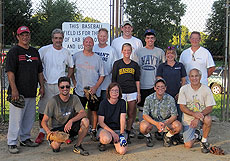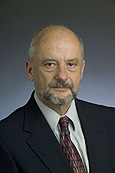|
Have a safe day!
Wednesday, Sept. 1
3:30 p.m.
DIRECTOR'S COFFEE BREAK - 2nd Flr X-Over
THERE WILL BE NO FERMILAB COLLOQUIUM THIS WEEK
Thursday, Sept. 2
2:30 p.m.
Theoretical Physics Seminar - Curia II
Speaker: Simon Badger, DESY Zeuthen
Title: Analytic Techniques for Massive One-Loop Amplitudes
3:30 p.m.
DIRECTOR'S COFFEE BREAK - 2nd Flr X-Over
4 p.m.
Accelerator Physics and Technology Seminar - Curia II (NOTE LOCATION)
Speaker: Shekhar Mishra, Fermilab
Title: Indian Institutions and Fermilab Collaboration: A Road We Travel Together
Click here for NALCAL,
a weekly calendar with links to additional information.
Upcoming conferences |
|
For information about H1N1, visit Fermilab's flu information site.
|
|
Wednesday, Sept. 1
Lunch
- Fire-steak salad
- Banana chocolate cake
Thursday, Sept. 2
Dinner
Closed
Chez Leon Menu
Call x3524 to make your reservation.
|
|
|
DUSEL users to discuss preliminary design report
The DUSEL users' organization, DuRA, will hold its first meeting on Thursday and Friday, Sept. 2-3, at Fermilab in One West. Online registration is now closed, but those who wish to attend will be able to register on-site. Those who cannot attend in person can watch the meeting streamed live.
The meeting will feature:
- Highlights of the preliminary design report for the proposed Deep Underground Science and Engineering Laboratory.
- Presentations by representatives from the National Science Foundation and the Department of Energy about their vision for the project.
- A discussion between the scientific users community and DUSEL representatives.
- A review of the needs of the physics, earth science and engineering communities.
- A description of proposed experiments, the allocation of space and expected resources.
For the agenda and other information, see the meeting website.
|
2010 Champions
 |
The Lightning Rods zapped the competition this year to win the title of 2010 Fermilab Coed Summer Softball League champions. Front row, left to right: Ryan Montiel, Susan Schaer and Paul Joireman, Glenn Wave. Back row, left to right: Orlando Rivera, John Fomusa, Rick Zifco, Dave Schuman, Whitney Begner, Dirk Hurd, Andrew Rauchmiller, Linda Purcell-Taylor and Greg Deuerling. |
|
Pine Street closures scheduled this week
Inbound Pine Street is scheduled to close from 10 a.m. today until Thursday afternoon for culvert repairs. Outbound Pine Street will also close overnight tonight. The Wilson Street entrance, which usually closes at 6 p.m., will remain open tonight. Outbound Pine Street is scheduled to close again on Friday, Sept. 3, from 7 a.m. until evening.
For more information, see Tuesday's announcement.
|
Program helps teachers learn
From CD Tracks, Aug. 2010
School may have been on hiatus, but these teachers didn't take a break this summer. The Teacher Research Associates (TRAC) program gives educators in science and technology the opportunity to gain research experience in science or engineering. Meet three science teachers who worked in the Computing Division this summer.
Robert Bartlett
Physics, Chemistry and Biology
Morton West High School, Berwyn
Worked with David Ritchie (Communications and Outreach group)
Bartlett worked with TARGET student Kimani Whitsey, who attends Whitney Young High School in Chicago and hopes to study computing engineering in college. The pair learned some Perl and Python programming and hoped to apply their newfound skills by creating a computer simulation that modeled a real-life situation at the lab.
Read more
|
IceCube neutrino observatory nears completion
From physorg.com, Aug. 31, 2010
In December 2010, IceCube-the world's first kilometer-scale neutrino observatory, which is located beneath the Antarctic ice—will finally be completed after two decades of planning. In an article in the AIP's Review of Scientific Instruments, Francis Halzen, the principal investigator of the IceCube project, and his colleague Spencer Klein of Lawrence Berkeley National Laboratory provide a comprehensive description of the observatory, its instrumentation, and its scientific mission—including its most publicized goal: finding the sources of cosmic rays.
"Almost a century after their discovery, we do not know from where the most energetic particles to hit the Earth originate and how they acquire their incredible energies," says Halzen, a professor of physics at the University of Wisconsin in Madison.
After light, neutrinos, which are created in the decay of radioactive particles, are the most abundant particles in the universe. High-energy neutrinos are formed in the universe's most violent events, like exploding stars and gamma ray bursts. Because the neutrino has no charge, essentially no mass, and only interacts weakly with matter, trillions of neutrinos pass through our bodies each day, without effect. On extremely rare occasions, a neutrino will strike the nucleus of an atom, creating a particle, called a muon, and blue light that can be detected with optical sensors. The trick is spying those collisions—and, in particular, the collisions of high-energy neutrinos. IceCube does it by sheer virtue of its size.
Read more
|
|
|
Tevatron extension
 |
| Fermilab Director Pier Oddone |
Last Friday we had a special meeting of the Physics Advisory Committee to address just one question: whether to recommend a proposed three-year extension of the Tevatron run. The Tevatron is now scheduled to close in September 2011.
The PAC's recommendation was very strong. They recommended that we run the Tevatron in each of two proposed scenarios, one with additional funding in Fermilab's budget for Tevatron operations and one with no such extra funding. The committee's recommendation recognizes the extraordinary performance of the Tevatron and its remaining promise for the future. Extended running, combined with the predicted improvement in data analysis, would allow the Tevatron to make critical contributions to the discovery of the Higgs boson and our understanding of electroweak symmetry breaking. The combined potential of the Tevatron extension and early LHC running would constitute the optimal campaign to solve the central issue of particle physics. Many eminent members of the U.S. particle physics community have written to Secretary of Energy Steven Chu to express their support for more Tevatron running. The extension also motivates the collaborations to retain physicists and add new ones to carry out this program.
Although the PAC strongly recommended extending Tevatron operations, they nevertheless explicitly recognized that it represents a short-term opportunity and does not change the long-range plans for the field.
While the PAC's recommendation celebrates the success and potential of the Tevatron, it is very problematic for us at Fermilab. Over the last couple of years, after the change in direction away from early construction of the International Linear Collider, we have successfully constructed an exciting and robust plan to pursue a broad program at the Intensity Frontier, including major future experiments like LBNE and Mu2e that are now at a critical stage. We are making good progress on Project X R&D, and we have a solid intermediate program with the NOvA and MicroBooNE experiments. We have strong partnerships with other national and international laboratories and universities. DOE and NSF are partnering to bring about DUSEL and LBNE, and the agencies have made substantial commitments of funds for the design of LBNE. They have built into their plans the necessary funding profiles to accomplish this program, and we are fully committed to this plan.
We will be working hard over the next few weeks with the agencies and our international partners to assess the impacts of the PAC's recommendation. Only if we are convinced that our leadership position at the Intensity Frontier-the long-term future of our laboratory-remains viable and robust will I move forward with this recommendation. I fully understand—and we all need to understand—that if we proceed with it, Fermilab will bear the brunt of the severe funding squeeze that results. For two reasons, I do not support squeezing the funds for an extension of the run out of the rest of the high-energy physics community. First, there are critical and forward-looking programs such as the LHC, dark matter searches, dark energy studies, and other Intensity Frontier programs that should receive support. Second, we should not take actions that have an adverse impact on our community. In the long term, we depend on the creativity, strength and diversity of our partnering institutions for a healthy national program and a healthy program at Fermilab.
|
|